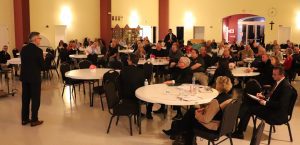Each year the Diocese of Venice provides certificates and continuing development opportunities for staff and volunteers to update them on Diocesan, local and potentially federal policies related to their specific area of responsibility.
 With this in mind, the Diocese offered a series of seminars in January and early February for members of Parish/School Finance Councils. Members of the Finance Councils are volunteers who generously provide their time and expertise while serving a critical role in support of their Pastor/Administrator. This work is done to ensure all pastoral needs are met, which includes financial stability, charitable work as well as planning for the future.
With this in mind, the Diocese offered a series of seminars in January and early February for members of Parish/School Finance Councils. Members of the Finance Councils are volunteers who generously provide their time and expertise while serving a critical role in support of their Pastor/Administrator. This work is done to ensure all pastoral needs are met, which includes financial stability, charitable work as well as planning for the future.
Bishop Frank J. Dewane welcomed the gathering on Jan. 21 at St. Patrick Parish in Sarasota, thanking the laity for sharing their experiences and expertise with their Parish/School and their Pastor/Administrator, as well as other members of their respective Finance Councils.
“We are blessed to have such volunteers who so passionately participate in the life of the parish and/or school,” Bishop Dewane added. “We’d be lost without people like yourselves. You are giving the advice and life experience in your respective areas and we are most grateful. Your contributions make a big difference for the priests of the Diocese who might not have the same experience in managing finances.”
The response to the seminars was overwhelmingly positive. One participant in the seminar said the information offered provided clarity to many questions while also providing context and a greater appreciation for the vastness and complexities of the Diocese.
The seminars, one held in each Deanery, helped to provide updates and a broad overview of Diocesan policies and procedures, future planning, and Diocesan growth related to finances. This was also an opportunity for Council members to understand the structure of the Diocese and to put a face to the names of Diocesan staff with whom they may interact and seek information. Topics addressed included the challenges inherent with rapid growth and seasonal nature of many of the parishioners as well as the fact that each Parish/School is unique and has its own issues.
This partnership between the Finance Council and the Pastor/Administrator is vital to the stable finances of any entity. Finance Councils assist the Pastor/Administrator in budgeting; review of quarterly financial statements; developing a long-term Parish/School capital improvement plan, including implementation and funding sources; developing a program for the care and maintenance of all facilities; development and maintenance of position descriptions for the Parish Business Manager/Accountant (bookkeeper) and other staff/personnel engaged in the management, operation or administration of the Parish; and to serve as a resource to advise the Pastor/Administrator on significant expenditures before making a purchase or lease commitment in accordance with Diocesan policies.
Each Parish/School undergoes a financial review every three years by an independent CPA firm, with which the Finance Council is an integral part. Parishes also participate in safety and security programs which must also be budgeted. One of the most challenging aspect of Parish/School finances is the maintenance and operation of the various buildings. As in a household, the Council must ensure that all expenses, such as electricity, water, security, and maintenance, as well as any salaries, are part of current future budgeting processes.
Long-term planning (three-month, one year, five years) is one of the more important aspects of the Finance Councils responsibilities. This is to ensure that the Parish/School is being a good steward of the money, in support of the Pastor/Administrator
Seminar presentations were from the Diocesan Director of Finance Peter McPartland; Risk Management Director Donna Foti; Director of Internal Finance Lorraine VanLede-Brown, Director of the Office of Stewardship and Development Carla Repollet, as well as the Executive Director of the Catholic Community Foundation of Southwest Florida Michael Morse.
Because of the complex nature of the Diocese, where each parish/school has its own unique identity and challenges, the gathering about finances was necessarily more of a general overview than a presentation on specific issues. This is because of the great diversity of the Diocese, with unique clusters of population and income ranges. However, each speaker addressed the most common topics relating to finances. Each seminar also concluded with a question and answer session.





